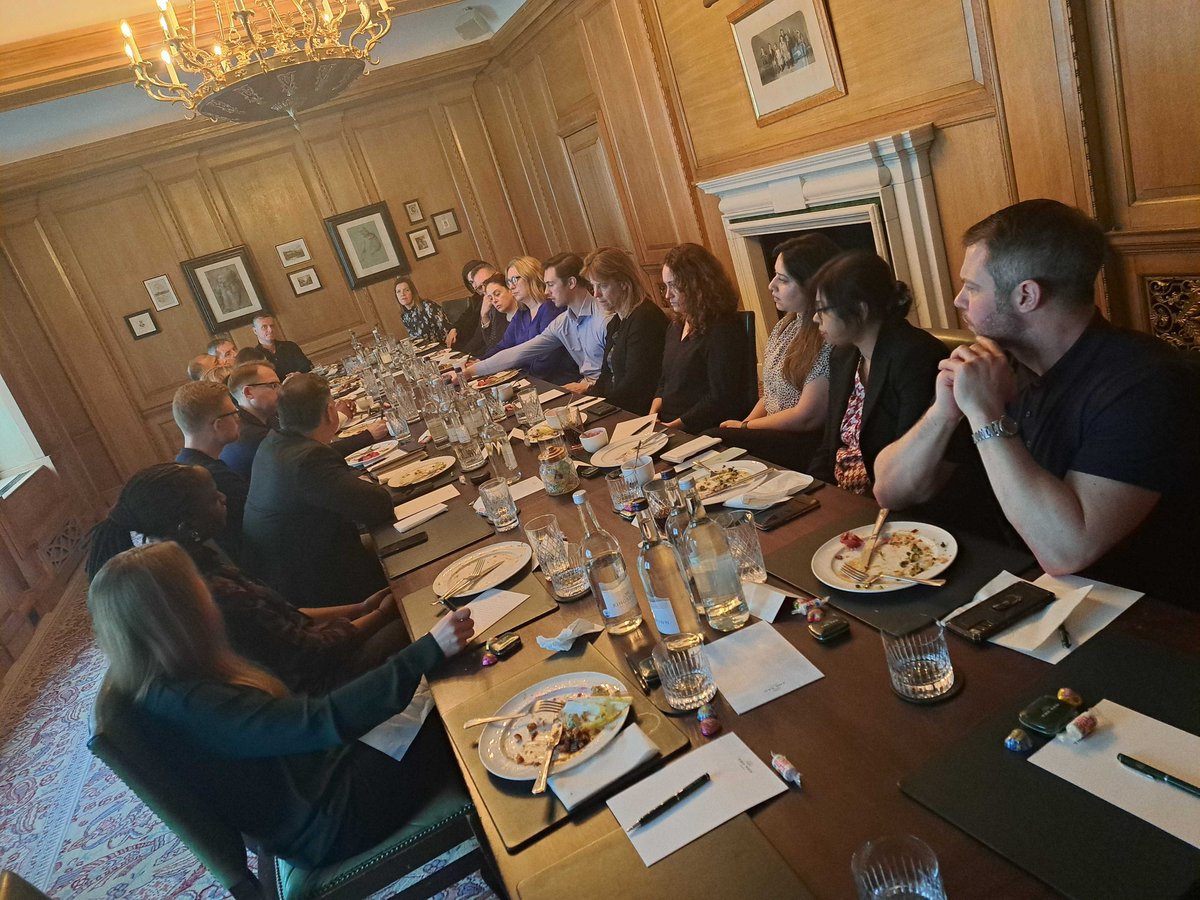
How is AI redefining trust, partnerships and experiences?
To celebrate Valentine’s Day this year HotTopics welcomed key members for our B2B marketing leaders community to share expertise, lessons, insights, challenges and, yes, the love, too. All are needed to navigate 2024.
For many, the year has started at a sprint and shows no signs of slowing. If 2023 was defined by a multiplicity of headwinds, from supply chain disruption to global inflation, further compounding marketing budgets and dynamics, 2024 may well be defined by the twin opportunities and risks associated with generative AI adoption. The former promises a bright new future; the latter warns of reputational damage and a legal, ethical quagmire. And yet neither quite seems to describe the reality experienced by B2B marketers right now.
This exclusive Food for Thought lunch provided a space for leaders to describe those experiences, and compare and contrast them inline with the direction of travel of the wider technology industry. Over a fascinating two hour, three-course lunch and debate, three key themes emerged time and time again, expanded upon below:
The new science of B2B marketing:
- AI Learnings
- Customer-Client Experiences
- Role of the B2B marketing leader
- The Studio: Event series for global marketing leaders
- Connect with the C-suite
B2B Marketing insights from:
- Adenike Cosgrove, VP Marketing EMEA, Proofpoint
- Amit Sharma, Global Head - Field Marketing, Demand Generation and Sponsorships, Tata Communications
- Ashish Babu, CMO - Europe & UK, Tata Consultancy Services
- Chris Merrick, Senior Director, Global Marketing, Shure
- David Keene, CMO, Europe, Wipro
- Emily Bloomfield, Marketing, Genesys
- Julie Woods-Moss, Member of the Global Coordination Group (Exec Co) and Chief Marketing Officer , Thoughtworks
- Kathryn Thomas, Director EMEA Marketing, Box
- Kritika Singh, Head of Sustainability & CSR Marketing - Europe, HCL Technologies
- Leanne Chescoe, Marketing Director EMEA, DemandMatrix
- Liz Lawson, Head of Marketing, UK and Ireland, Box
- Lois Smith, Field & Technology Marketing Leader, International Business Machines
- Marie Thornton, Global Lead - 5G Edge Market Development, Verizon Communications
- Merinda Hillier, VP - Marketing, Tealium
- Rhian Buller, Senior Partner Marketing Manager, Genesys Cloud Services
- Rob Wood, Head of Enterprise Marketing, Google
- Shikha Saxena, Head of Marketing UK&I, Globant
- Steven Goddard, Senior Director, WW GTM Strategy & Planning, Nutanix
- Suzi Williams, NED, JD Sports
- Tricia Stinton, CMO, Capgemini
AI learnings
AI in the industry
For B2B marketers to capitalise on the bounty of generative AI in particular, understanding the wider industry’s position is key.
Trust is the byword of success, today. Trust in your data to encourage trust in your generative AI outcomes, which feeds trust in the industry, particularly with strategic partners—within which many B2B marketers would count themselves. This is critical for the technology C-suite in particular and for their future plans. Indeed, trust was the overarching theme for 2024’s World Economic Forum, which itself was dominated by AI.
The determining factors of trust in AI seems to be data, talent and partners.
The technology C-suite is vocal about the need for cloud-enabled services and infrastructure, structured, available data and good data governance, and fewer partners that are more strategically—closer, trusted—placed. In many ways this is one of the best opportunities for B2B marketers in technology to prove their business’ value to customers.
Yet this is also an age of what we heard of as “magical thinking”. AI cannot solve everything and should not be used as a silver bullet—not least because it would be disingenuous to do so—given the lower tolerance for risk in B2B enterprise customers, reported by those around the table.
Finding a balance between capitalising on the interest with generative AI, supporting customers in their own journeys, whilst being pragmatic about what is truly possible, requires an authentic position. To bring it all full circle, authenticity breeds trust.
AI in marketing
In their own backyard, as it were, the marketers around the table shared a range of appetite for AI experimentation. Much of it is dictated by how regulated a sector is, first, but also by leadership type, team dynamics, personality types, even. AI experimentation is only a positive if the ethics and guardrails have been created in advance, we heard, and as such creates some interesting benefits.
The low hanging fruit for generative AI is in automation of tasks, in creative content generation for digital marketers, and in back-end process programming for, say, lead scoring, sentiment analysis or sales targets. Reports that AI was being explored to reduce marketing budget was met with nervous laughter; the most forward-thinking executives outside of marketing should see AI as a way to do more with the same—or even more with more. But it is the responsibility of marketers today to prove that point, and prove the value of marketing in an increasingly AI-smitten world: their closeness to the customer.
Customer-client experience
Marketing’s positioning close to the customer is the first key strategic priority for the function this year. The second is to show that to the C-suite and Board. The third is to explain why that relationship makes marketing a critical business function in an AI world.
That first priority involves considering the multiplicity of customer channels you own as a marketer, we heard, and how contextual, real-time conversations can be fostered throughout. Touchpoints that allow you to understand how customers want to experiment with AI (for example) builds a better bond. And keep the human in loop—the more we lean on technology, the more marketers believe personalisation is key.
For the second, marketers will need to lean into their storytelling skill-sets. The CEO and Board know far less about AI and its wider industry impact than they let on, on average (see high CEO churn rates for 2023). For technology vendors to capture market share, a highly symbiotic relationship with existing customers and a wider community of interested parties will breed more intuitive products, services, or even entire transformations. No function is better placed to achieve that than marketing.
Third, the future is even less predictable than before. The rewards of AI are great; the risks are greater. Regulations are already catching CIOs and Chief Data Officers out. Reputational damage is hard to quantify in the abstract but simple to track in reality. With the glut of information obscuring fact from fiction, the balance of scale vs. personalisation is hard to manage without close connections to market research and customer feedback. Marketers should lean heavily on their ability to capture this, to capture Board attention.
In short for 2024, knowledge of the customer should trump knowledge of AI for the marketing function.
Role of the B2B marketing leader
Of course, that does not mean knowledge of AI should be ignored or sidelined. It is an imperative to not just track this innovation’s progress in the wider market, but to connect different parts of the business to show what is needed to improve customer experiences, drive revenue and market share, and diversify.
One idea is to include an AI expert, or team of experts if budget allows, within the marketing team. Allow them to sit and learn about the brand and what is at stake, become a marketing ally so when they head to other departments they know what is needed from, say, technology, or product teams. The language barrier is broken down, as is the communication barrier.
AI does not have to define the marketing strategy—although in some cases we heard there are instances of this happening—but it can be built into your brand pillars, discovering efficiences or previously untapped resources. Generative AI is predicted to be able to expand what is called the ‘white space’ of innovation: what humans did not realise it can achieve with AI.
That type of experimentation also sits well within the creative spaces of the marketing function.
These creative spaces might be getting sidelined in the attention directed towards AI for customers, AI for marketing and what that means for the future of the function; in other words, the science of marketing. What does it mean for the art of marketing? That is a necessary question for a future Food for Thought lunch.
The Studio: 22nd May 2024
Event series for global marketing leaders
Mark your calendars for May 22nd, 2024, and prepare to step into the spotlight at The Studio, hosted live from the iconic Abbey Road Studios. This exclusive event series invites marketing leaders from across the globe to shape the business agenda on a world stage
Connect with the Technology C-Suite through HotTopics
HotTopics opens the door for you to connect with the technology C-suite, offering unparalleled access to industry leaders and decision-makers. Discover how our platform can facilitate meaningful conversations, foster strategic partnerships, and unlock new opportunities for your business.
Images from the Food for Thought: CMO Valentine's Special


SUBMIT A COMMENT
RELATED ARTICLES
Join the community
To join the HotTopics Community and gain access to our exclusive content, events and networking opportunities simply fill in the form below.
